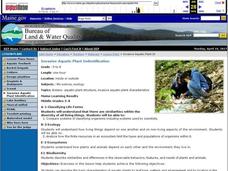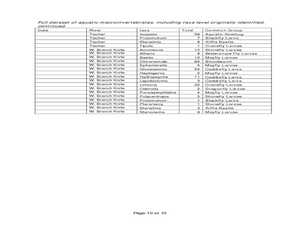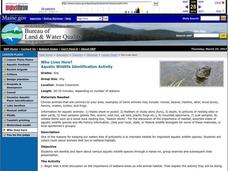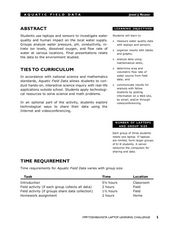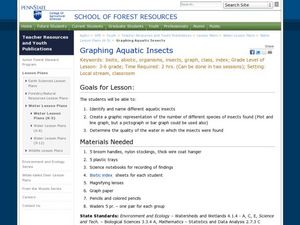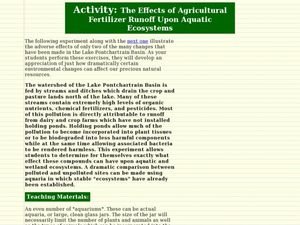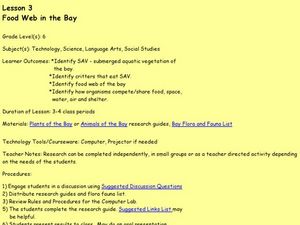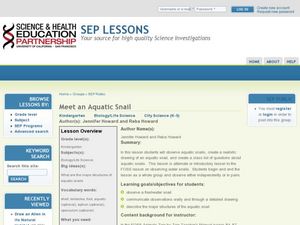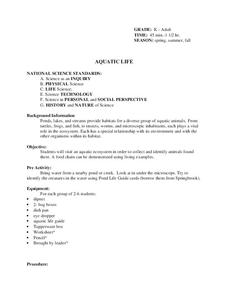Curated OER
The Marvels of Mud
Young scientists roll up their sleeves and get a little dirty in this three-day earth science investigation. Following the scientific method, children monitor the growth of algae in pond water samples in order to determine the role that...
Scholastic
Study Jams! Aquatic Ecosystems
Mia's friends are fish-sitting while she is away on vacation. Zoe divulges to Sam that different animals need different habitats, and that there are both freshwater and saltwater ecosystems. Examples of the kinds of organisms found in...
Curated OER
Aquatic Life
Sixth graders work in pairs to research information related to aquatic life using references from the World Wide Web. They present their findings in the form of an oral presentation to the class.
Curated OER
Dissolved Oxygen in an Aquatic Ecosystem
High schoolers explain why dissolved oxygen is important in aquatic ecosystems. They evaluate the optimal dissolved oxygen levels for living organisms.
Curated OER
Aquatic Ecosystems
Students study the diversity of marine life and their habitats. For this aquatic ecosystems lesson students complete a lab activity and experiment.
Curated OER
Invasive Aquatic Plant Identification
Young scholars observe aquatic plants and animals and identify their systems. In this plants and animals lesson plan, students compare systems of organisms and orally express how plants and animals rely on each other.
Curated OER
Marine & Aquatic Habitats Activities - Aquatic Animals
Learners explore importance of marine or aquatic habitats, and investigate habitat characteristics and conditions required by various organisms to ensure survival. They then select an animal to study and design an artificial habitat...
Curated OER
Aquatic Invertebrates
Students examine the impact that human development has on streams. In this stream sampling lesson plan students compare macroinvertebrate data and graph it.
Curated OER
Aquatic Exotics
Learners identify and describe the aquatic exotic species found in Illinois. Using the internet, they research the species origins and discover their effects on native species in the area. They discuss how appropriate it is to introduce...
Curated OER
Careers With an Aquatic Emphasis
Students are introduced to careers with an aquatic emphasis. They take a self-evaluation test on what they enjoy in school to determine which career is right for them. They listen to people in the field discuss what their job is like.
Curated OER
WET Science Lesson #3: Comparison of Aquatic and Terrestrial Plants
Elementary life science explorers compare and contrast aquatic and terrestrial plants (elodea and soybeans) in a Venn diagram. Some background information is provided to support direct instruction, and general instructions are provided...
Curated OER
Who Lives Here?
Students identify various aquatic wildlife species. In this biology lesson students collect clues about animals that live in wetland habitats. Students rotate through several stations displaying particular animal species to collect their...
Kenan Fellows
Use of Dichotomous Keys to Identify Stream Organisms
What kind of organisms are living in the stream? After an explanation on how to use a dichotomous key, groups of three to four use the keys to identify macroinvertebrates from a local freshwater stream. Using the the concept of Stream...
Alabama Wildlife Federation
Life in a Pond
What living things call an aquatic habitat home? Young learners consider the question after they discuss the characteristics of a typical pond habitat. They identify an animal and then determine if a pond would have all the components to...
Curated OER
Aquatic Field Data
Students use laptops and sensors to measure water quality and graph their results. For this aquatics lesson students post their results to a website or email.
Curated OER
Graphing Aquatic Insects
Students identify aquatic insects. In this organism instructional activity, students locate aquatic insects near a local waterway and collect them. Students graph the amount of insects that they collected.
Curated OER
The Effects of Agricultural Fertilizer Runoff Upon Aquatic Ecosystems
Students measure the toxic levels of runoff and discuss the effects it would have on the aquatic system. For this runoff lesson plan, students answer questions to how runoff would affect the animals in an aquatic system.
Curated OER
Does the Introduction of Pesticides and Fertilizers Alter an Aquatic Ecosystem?
Students conduct an experiment using a small sample from a local water source. They introduce fertilizers and pesticides, separately, and carefully examine the results in their simulated aquatic ecosystem.
Curated OER
No Child Left Inside Lessons
The benefits of taking students outside for outdoor activities and lessons can be substantial for everyone.
Curated OER
The High Cost of Chemical Dependency
Sixth graders explore, analyze and study the effect and impact that humans have on the environment based on their choices as individuals, businesses and governments. They assess the balance between human activities and aquatic pollution.
Curated OER
Food Web in the Bay
Sixth graders study the food web in a bay. In this food web lesson plan, 6th graders investigate the SAV- submerged aquatic vegetation of a bay including their predators, and how the organisms eat, have proper living space and water....
Curated OER
Meet an Aquatic Snail
Students explore aquatic snails. In this life science lesson, students create a class list of questions about aquatic snails and begin to observe aquatic snails in the classroom. Students record observations.
Curated OER
Aquatic Life
Students explore aquatic life. In this science lesson, students visit an aquatic ecosystem and collect animals found there. Students create a food chain for the aquatic ecosystem.
Curated OER
Aquatic Science and IPC
Students explain the importance of water in our daily lives. In this aquatic science lesson, students identify different ways to purify water and make it potable. They design and construct a water filter based on researched information.







